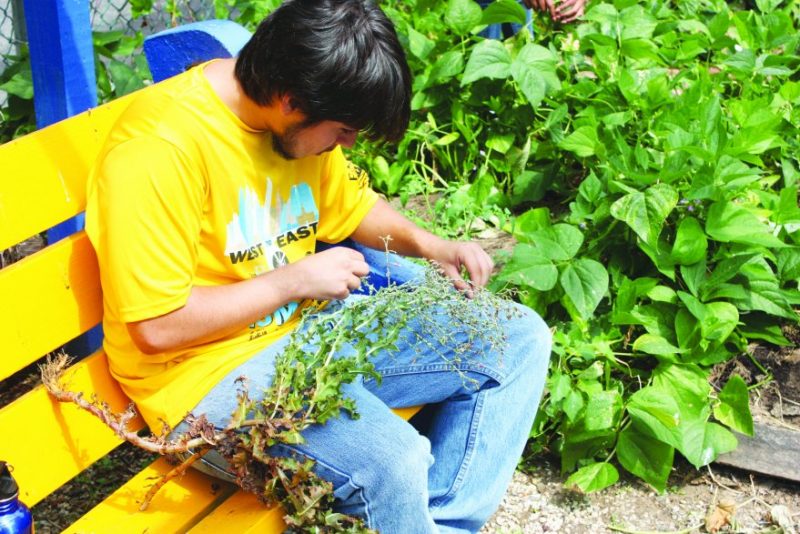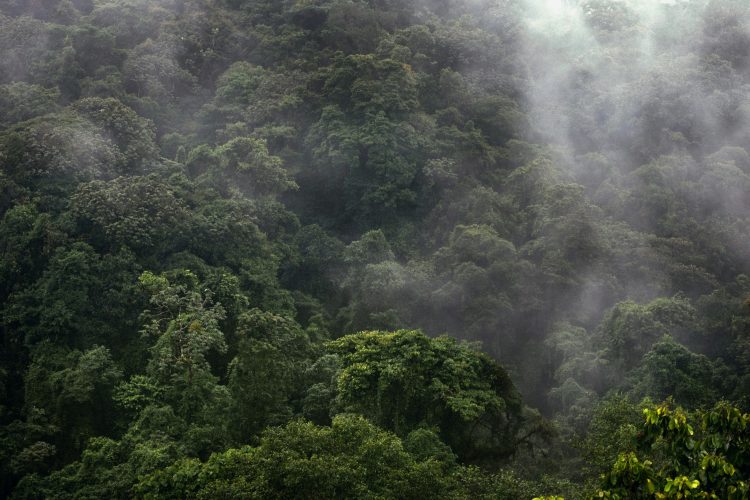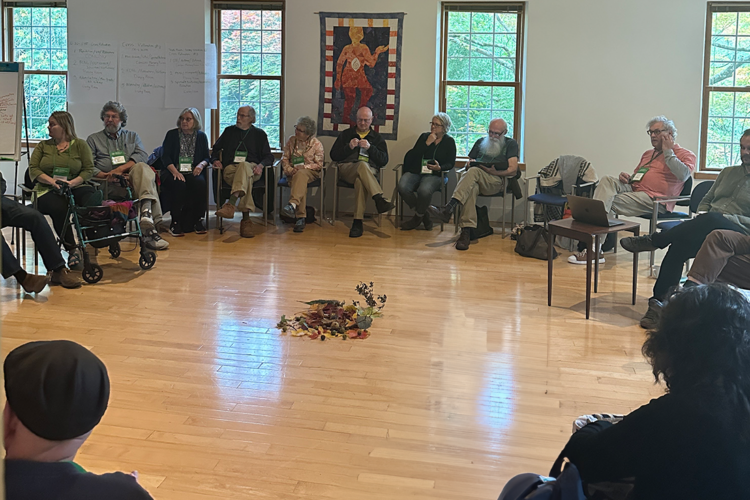Praying on Seeds: Solidarity for Puerto Rican Sovereignty

By Marian Dalke.
SUNDAY MORNING’s soft light casts through deep wooden windows. The light shifts and picks up the soft cotton of milkweed seeds, sailing over the heads of those gathered for Quaker Meeting for Worship at Central Philadelphia Monthly Meeting. Grace Gonglewski shares a message about “praying on seeds,” as she casts more milkweed seeds about her, stirring magic among those present.
Grace’s message connects with me as an urban farmer. “Praying on seeds” is very familiar to me. Every early March, I press each seed’s small, tiny shape into damp soil, anticipating a future harvest, a shared meal, a gift passed to a neighbor.
I’ve been working as the Urban Garden Manager at Norris Square Neighborhood Project (NSNP) since March 2015. NSNP has an incredible history and legacy, and I am grateful to continue to steward six garden spaces started by Grupo Motivos, a grassroots group of Puerto Rican women. Gathering together since the 1980s, Grupo Motivos cultivated and curated over 12 cultural gardens from vacant, abandoned lots throughout the Norris Square community in West Kensington, Philadelphia. Responding to the trauma of a drug raid that took over 60 community members to prison, Grupo Motivos sought to create sites of healing and unity, and opportunities for elders, youth, and visitors alike to celebrate Puerto Rican heritage and culture.
Many of the crops we grow in NSNP’s gardens are saved and propagated from Grupo Motivos’ original plants. Tropical plants, such as orange and avocado trees, hibiscus, lemongrass, oregano brujo, and hoja de bruja, are each carefully tended to keep them flourishing year round. And when it is fall again, it will be time to gather seeds. Those tiny seeds from spring will have since germinated, flowered, and fruited, and then will bear seeds of their own. Squishy tomato seeds in red, yellow, and purple need to ferment before drying and sprouting. Beans with tiger eyes and scarlet runners and peppers in dozens of varieties tangle and twine together in the field. Tomatoes climb skyward up the grapevine and beans twirl around the arching sunflowers. Each plant contains dozens of seeds; each seed contains multitudes, future generations that will reach down into the soil and sprout forth. This brings me infinite hope and possibility to feed myself, my family, my community of people, butterflies, cats, chickens, and honeybees.
And so, last year in the weeks after the devastation of Hurricane María in the Caribbean, a friend and organizer with the group Soil Generation reached out to say, “we are going to Puerto Rico and we need seeds.” A gardener in Las Parcelas, our community garden, also shared with me that her mom was going to Puerto Rico and wanted to take seeds. “We need organic sugar and honey to feed the bees and keep them alive until the native flora comes back.” As many people were focused on immediate emergency response, waiting to hear from family members, there were those already planning and preparing for the island’s food sovereignty.
So crippled and confined by its colonial status to the U.S., Puerto Rico is chained by a fiscal debt crisis of over 73 billion dollars. The Jones Act prohibits the delivery of aid from other countries to the island. Although Puerto Rico imports 80 percent of its food, it is home to a burgeoning local food movement aiming to source food from its fertile soil. With its fierce and consistent liberation movements, Puerto Rico asks for seeds, a source of autonomy and sovereignty.
What an honor, what an excitement, what a calling—yes, seeds! Many of the seeds I’ve been keeping come from Puerto Rican neighbors who have taught me how to plant gandules, ajíces, and calabaza from seeds they brought from Puerto Rico, seeds that have been pressed in envelopes, in bottles and luggage, in hands trusting that the flavors and sustenance of their homeland could be cultivated in the urban north, seeds they have been growing in these gardens created as a refuge for Puerto Ricans coming to the mainland. Raised in North Philadelphia lots for the past four decades, these generations of seeds are now returning, making the journey homeward to bring nourishment to the people of Puerto Rico.
Norris Square Neighborhood Project sent a shipment of seeds with a gardener’s mother in the fall, packed and sorted by Raíces de Cambio (Roots of Change) High School Youth Gardeners. Another shipment of alcolado (an herbal healing remedy), prepared by Raíces de Cambio youth, accompanied seeds from Grace and her husband’s garden. Central Philadelphia Monthly Meeting First Day School students decorated the bags of seeds. These were brought to Puerto Rico with a delegation of gardeners, educators, and birth workers from Urban Creators and Wholistic Art on Thanksgiving Day. This is a small token of faith, yet still significant. May we continue to pray on seeds, cultivating a solidarity of food sovereignty.
Visit the sites below to support the relief work of grassroots groups and farmers in Puerto Rico:
Shared by the HEAL Alliance:
- Boricuá Organization for Ecologic Agriculture 28-year old farmer-led organization dedicated to rebuilding the island’s food sovereignty and supporting farmers.
- Resiliency Fund of Puerto Rico
Prepared by Eddie Irizarry of Bread and Roses Community Foundation:
- www.mariafund.org– all funds go to grassroots orgs
- fondoderesilienciapuertorico.tumblr.com/– food activism and efforts to re-plant Puerto Rico’s crops
- www.defendpr.com/relief/– support front line Puerto Rican communities in their recovery and rebuilding efforts
- www.ecokitpuertorico.org/– offers itemized list and pre assembled kits.
- www.fundacionbuenavibra.org/– focus on repairing roofs and healthy coexist
For more information about Norris Square Neighborhood Project:
- Website: www.myneighborhoodproject.org
- Facebook:www.facebook.com/myneighborhoodproject/
- Twitter: #ilovensnp
Acknowledgements: Thank you to Sandra Andino and Anne Dalke for their comments and edits on this article.

